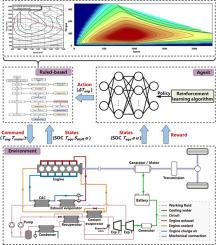Trucks consume a lot of energy. Hybrid technology maintains a long range while realizing energy savings. Hybrid is therefore an effective energy-saving technology for trucks. Recovery of engine waste heat through the organic Rankine cycle further enhances engine efficiency and provides effective thermal management. However, the powertrain greatly increases the complexity of energy management system. In order to design an energy management system with high efficiency and robustness, this study proposes a deep reinforcement learning embedded rule-based energy management system. This method optimises the key parameters of the rule-based energy management system by inserting deep reinforcement learning into it. Therefore, this scheme combines the good optimization effect of deep reinforcement learning and the excellent robustness of rule. In order to verify the feasibility of this scheme, this study builds the system dynamic model and carries out a simulation study. Subsequently, a hybrid powertrain semi physical experimental bench was constructed and a rapid control prototype experimental study was carried out. The simulation results show that the deep reinforcement learning embedded rule-based energy management system can reduce the energy consumption by 4.31 % compared with the rule-based energy management system under the C-WTVC driving cycle. In addition, energy saving and safe operation can also be achieved under other unfamiliar untrained driving cycles. The rapid control prototype experimental study shows that the deep reinforcement learning embedded rule-based energy management system has good agreement in experiment and simulation, which demonstrates the potential for real vehicle engineering applications and promotes the engineering application of deep reinforcement learning.



